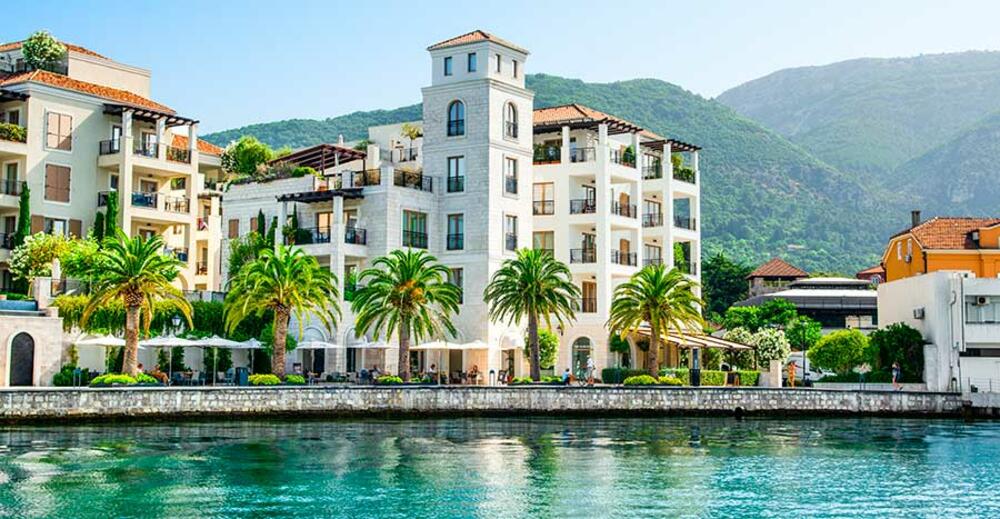Whether you are considering seasonal work, looking for a permanent job, or planning to start a new career, this guide will provide valuable information to help you navigate the job market in Montenegro.
Overview of the Job Market
When it comes to employment, Montenegro offers a diverse range of job opportunities, catering to various skill sets and experience levels. The job market is dynamic, with vacancies available in different sectors, including healthcare, education, construction, hospitality, real estate, technology, and analytics. From entry-level positions to managerial roles, job seekers can explore opportunities in sales, marketing, customer service, administration, logistics, engineering, and more. These job opportunities provide individuals with the chance to pursue their passion and contribute to it country's growing economy.

Types of jobs available for work
The job market encompasses a wide range of industries and job positions. Whether you are looking for seasonal work or a long-term career, you will find opportunities that match your skills and interests. Some of the popular job sectors in Montenegro include:
- Healthcare Logistics: There is a demand for healthcare professionals, including doctors, nurses, and medical technicians, in both public and private sectors.
- Educations: The country has a growing number of international schools and language centers, creating opportunities for teachers, tutors, and administrative staff.
- Construction: With ongoing infrastructure projects, there is a need for skilled workers in construction, including architects, engineers, and construction workers.
- Hospitality: The tourism industry is thriving, providing plenty of job vacancies in hotels, resorts, restaurants, and tour companies.
- Real Estate: The booming real estate market requires professionals in property management, sales, and marketing.
- Technology: Montenegro is quickly becoming a hub for tech startups, offering employment opportunities for software developers, IT specialists, and digital marketers.
These are just a few examples, and the job market continues to evolve, creating new vacancies and career prospects.
Average salaries
Salaries in Montenegro vary depending on the industry, job role, and level of experience. It is important to research average salary ranges to have a better understanding of fair compensation for job offers. The average salaries in Montenegro reflect the cost of living and the country's economic landscape.

For instance, salaries in the healthcare sector, especially for specialized doctors, are typically higher compared to other fields. Similarly, managerial positions in established companies often come with attractive remuneration packages. On the other hand, entry-level positions may offer lower salaries but can provide valuable work experience and opportunities for career growth.
Employment Laws
Before diving into the job market, it is essential to familiarize yourself with the employment laws in Montenegro. These laws safeguard the rights and interests of employees, ensuring a fair and respectful work environment. The country has regulations in place regarding employee rights, working hours, leave entitlements, payroll, and more. By understanding these laws, job seekers and employees can ensure their rights are protected and navigate the job market with confidence.
Employee rights
Employees in Montenegro enjoy various rights and entitlements, designed to protect their well-being and establish fair employment practices. Some key employee rights include:
- Health Insurance: Employers are required to provide health insurance coverage for their employees, ensuring access to medical care.
- SickLeave: Employees are entitled to sick leave, allowing them to take time off work when they are ill or injured.
- Annual Leave: Employees have the right to annual leave for rest, recreation, and personal time off.
- Employment Contracts: Employment contracts outline the terms and conditions of employment, including job responsibilities, compensation, and benefits, creating a legally binding agreement between the employer and employee.
Understanding these employee rights is essential for a harmonious work environment and ensures that both parties are aware of their obligations and entitlements. It is important to review employment contracts thoroughly and seek legal advice, if necessary, to protect your rights as an employee in Montenegro.
Working hours and overtime regulations

In Montenegro, employment laws define standard working hours and regulations for overtime work. The typical workweek consists of 40 hours, with weekends off, promoting work-life balance. Additional work hours beyond the standard workweek are considered overtime and are subject to specific regulations.
Overtime work should be compensated at a higher rate, typically 50% more than the regular hourly rate. Employers are required to keep accurate records of overtime hours worked, and employees have the right to refuse excessive overtime work. Understanding these working hour regulations is essential for maintaining a healthy work-life balance and ensuring fair compensation for additional work hours.
Annual leave and public holidays
In Montenegro, employees are entitled to annual leave for rest, recreation, and personal time off. The duration of annual leave depends on the length of employment, typically ranging from 20 to 30 days per year. The specific entitlements are outlined in employment contracts or regulated by collective agreements.
The country also has several public holidays throughout the year, which provide additional time off for employees. Public holidays include national celebrations, religious observances, and other significant events. Being aware of public holidays enables employees to plan work schedules and vacations effectively, contributing to work-life balance, and ensuring a well-deserved break from work.
Steps for Applicants to Find Work in Montenegro
Finding a job in Montenegro requires an organized approach and a clear understanding of search strategies. Whether you are a resident or an expatriate, these steps can help you streamline your search process and increase your chances of success.
Where to look for vacancies
The first step in finding a job in Montenegro is to explore vacancies through various channels. Some effective avenues to search for opportunities include:
- Job search websites: Online portals and platforms list vacancies across different industries and positions.
- Employment agencies: Recruitment agencies can connect job seekers with employers looking for specific skills and qualifications.
- Company career pages: Many companies advertise vacancies on their official websites, providing direct access to work opportunities.
- Local newspapers and classifieds: Traditional media platforms, such as newspapers, often feature work advertisements, especially for local positions and industries.
- Networking: Building professional connections and networking with industry professionals can lead to referrals and hidden job vacancies.
- job fairs: Attending job fairs and career events provides opportunities to connect with potential employers and learn about vacancies.
By utilizing these resources, job seekers can access a wide range of vacancies and increase their chances of finding suitable employment.
How to Use LinkedIn to Improve Your Search for Work in Montenegro
In today's digital age, LinkedIn has become an invaluable tool for job seekers. Optimizing your LinkedIn profile and using the platform effectively can significantly enhance your search in Montenegro. Here are some tips:
- Create a compelling LinkedIn profile: Craft a professional profile that highlights your skills, experience, and achievements. Use keywords relevant to your desired positions.
- Engage with professionals and join relevant groups: Engaging with others on the platform, connecting with industry professionals, and joining relevant LinkedIn groups can expand your network and expose you to opportunities.
- Actively search for postings: Use the job search feature on LinkedIn to find postings in Montenegro. Set up alerts to receive notifications of relevant vacancies.
- Showcase your qualifications: Highlight your education, certifications, and skills on your LinkedIn profile. Upload a well-crafted CV and list your contact information, including your email address, for potential employers to reach out.
- Connect with HR professionals or send direct messages: Networking on LinkedIn allows you to connect with HR professionals directly. Send a personalized message expressing your interest and attaching your CV for consideration.
By leveraging LinkedIn, job seekers can increase their visibility, connect with potential employers, and improve their job search outcomes in Montenegro.
Tips for acing job interviews in Montenegro
To increase your chances of success in job interviews in Montenegro, preparation is key. Here are some tips to help you ace your job interview:
- Research the company: Familiarize yourself with the company's culture, values, and recent projects.
- Dress professionally: Dress appropriately for the job interview, wearing formal or business attire.
- Arrive on time: Be punctual and arrive at the interview location a few minutes before the scheduled time.
- Prepare answers to common interview questions: Practice your responses to common interview questions, highlighting your skills, experience, and achievements.
- Ask insightful questions: Prepare a list of questions to ask the interviewer, demonstrating your interest in the company and the job role.
- Follow up with a thank-you email: Send a thank-you email to the interviewer after the interview, expressing your gratitude for the opportunity.
By following these tips, job seekers can make a positive impression during job interviews and increase their chances of securing employment.
Getting a Work Permit
Eligibility for a work permit in Montenegro
To be eligible for a work permit in Montenegro, you must secure a job offer from a Montenegrin employer and hold a residence permit valid for the entire employment period. It is essential to demonstrate the required qualifications and skills for the position, along with adhering to specific job-related requirements. Moreover, maintaining a clean criminal record in both Montenegro and your home country is crucial for obtaining a work permit. These factors, along with obtaining a permanent residence permit, play a significant role in determining eligibility for a work permit.

When applying for a work permit in Montenegro, you will need to provide several documents. These include a valid passport and visa if required. Additionally, you will need to show proof of accommodation and have health insurance coverage for the duration of your employment. You must also obtain a clean criminal record certificate from your home country and present an employment contract from the company in Montenegro.
Work Visa.
Individuals interested in obtaining a work visa need to meet specific eligibility criteria set by the authorities. This may include having a valid passport, a job offer from a Montenegrin employer, and proof of accommodation within the country. Additionally, applicants must satisfy the requirements related to the intended nature of their employment, ensuring compliance with Montenegro's immigration policies and regulations.
Eligibility for a work visa
To qualify for a work visa in Montenegro, you need a job offer from a local employer and a valid work permit from the Employment Agency. Additionally, proving financial ability to support yourself and securing suitable accommodation are essential. A clean bill of health with medical insurance coverage is also required. Ensuring compliance with these criteria will enhance your chances of obtaining a work visa and starting your professional journey in Montenegro.
Required documents for a work visa
To obtain a work visa in Montenegro, you will need to prepare the following documents: Firstly, ensure that your passport has at least six months of validity remaining. Next, complete the visa application form and attach a recent passport photo. Additionally, you will need to provide a letter of employment from a Montenegrin employer, along with evidence of arranged accommodation in Montenegro. These documents must be submitted in person at the Embassy of Montenegro in your country of permanent residence. Finally, make sure to demonstrate proof of sufficient funds to cover your living expenses while in Montenegro.
Navigating the Tax System in Montenegro
Understanding the tax system in Montenegro is crucial for anyone working in the country. When it comes to banking in Montenegro, having a local bank account is essential for managing your finances and receiving your salary. Additionally, being aware of the income tax rates and social security contributions will help you plan your finances effectively.

Income tax in Montenegro
Montenegro's income tax system follows a progressive rate for personal income, with tax residents being liable for taxation on their global income. There are various tax reliefs and allowances available to reduce taxable income, and social security contributions are considered deductible expenses for tax purposes. Non-residents are only taxed on their income sourced within Montenegro.
social security
Employers in Montenegro actively participate in the social security system, which plays a crucial role in funding various benefits such as health insurance, sick leave, and annual leave for employees. The government has established specific rates for these contributions, and employers are required to make monthly contributions, which are then reported to the relevant authorities. It's important to note that expatriates working in Montenegro are also encompassed by the country's social security system, ensuring that they have access to necessary benefits during their employment.
Living and Working in Montenegro: What to Expect?
Discover the diverse job opportunities in Montenegro's tourism, real estate, and IT sectors. Experience a work culture that follows a 40-hour workweek with weekends off. Expats can take advantage of the opportunity to buy property in Montenegro, while residents benefit from an accessible and cost-effective health insurance system.
Best cities in for ex-pats?

Looking for the best cities in Montenegro for expats? Consider Kotor a UNESCO World Heritage Site with stunning medieval architecture. Podgorica, the capital, offers a vibrant job market and affordable living costs. Budva's beaches make it a great choice for seasonal work in the tourism industry. Tivat, home to Porto Montenegro, provides employment opportunities in luxury tourism. And don't forget about Herceg Novi, a coastal town known for its relaxed lifestyle and picturesque surroundings.
What industries are currently thriving in Montenegro for English speakers?
Thriving industries include tourism, agriculture, fishing, and the rapidly growing IT sector. Other thriving sectors are manufacturing, construction, and energy. These industries offer a range of employment opportunities for individuals seeking work in Montenegro.
Are there any language requirements for working in Montenegro?
Language requirements for work in Montenegro vary depending on the job and employer. While knowing the local language can be helpful, English is widely spoken, especially in tourist areas. Some positions may require fluency in the local language or other languages like Russian or German. Language classes and tutors are available for those looking to improve their language skills, and there are also programs available for those interested in learning the local language for work purposes.
Bonus video:





